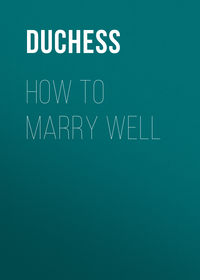 полная версия
полная версияRossmoyne
And then, as his eyes light upon his foes, his spirit dies. Poor old ladies, so stupefied, so stricken! are they not already conquered? Looking at the frail front they present, he feels his weapons must be blunted in this fight, his gloves anything but steel.
A terrible silence fills the room, – a silence that grows almost unbearable, until at length it is broken by Miss Priscilla. Her voice is low, and hushed and broken.
"Monica, why did you deceive us?" she says.
There is reproach, agonized disappointment, in her tone, but no anger.
To these poor old women the moment is tragical. The child of their last years – the one thing they had held most dear and sacred – has proved unworthy, has linked herself with the opposition, has entered the lists of the enemy. They are quite calm, though trembling. Their grief is too great for tears. But they stand together, and there is a lost and heart-broken look about them.
Monica, seeing it, breaks away from her lover's restraining arms, and, running to Miss Priscilla, falls down on her knees before her, and, clasping her waist with her soft, white arms, bursts into bitter tears. She clings to Miss Priscilla; but the old lady, though her distress is very apparent, stands proudly erect, and looks not at her, but at Desmond. The tears gather slowly in her eyes – tears come ever slowly to those whose youth lies far behind – and fall upon the repentant sunny head; but the owner shows no sign of forgiveness; yet I think she would have dearly liked to take the sweet sinner in her arms, to comfort and forgive her, but for the pride and wounded feeling that overmastered her.
"Your presence here, sir, is an insult," she says to Desmond, meaning to be stern; but her grief has washed away the incivility of her little speech and has left it only vaguely reproachful. Desmond lowers his head before her gaze, and refrains from answer or explanation. A great sorrow for the defencelessness of their sorrow has arisen in his breast for these old aunts, and killed all meaner thoughts. I think he would have felt a degree of relief if they had both fallen upon him, and said hard things to him, and so revenged themselves in part.
Monica is sobbing bitterly. Not able to endure her grief, Desmond, going even to the feet of Miss Priscilla, tries to raise her from the ground. But she clings even more closely to Miss Priscilla, and so mutely refuses to go to him.
A pang, a sudden thought, shoots through him, and renders him desperate. Will they be bad to his poor little girl when he is gone? will they scold her?
"Oh, madam," he says to Miss Priscilla, with a break in his voice, "try to forgive her; be gentle with her. It was all my fault, – mine entirely. I loved her, and when she refused to hear me plead my cause, and shrunk from me because of that unhappy division that separates my family from yours, and because of her reverence for your wishes, I still urged her, and induced her to meet me secretly."
"You did an evil deed, sir," says Miss Priscilla.
"I acknowledge it. I am altogether to blame," says Desmond, hastily. "She has had nothing to do with it. Do not, I beseech you, say anything to her when I am gone that may augment her self-reproach." He looks with appealing eyes at Miss Blake, his hand on Monica's shoulder, who has her face hidden in a fold of her aunt's gown.
"Sir," says Miss Priscilla, drawing herself up, with a touch of old-world grandeur in her manner, but a sad tremulousness in her tone, "my niece has been with us now for some time, and we have dared to hope she has been treated in accordance with the great love we feel for her."
"The great love," echoes Miss Penelope, gently. Though deeply distressed, both old ladies are conscious of a subdued admiration for the young man, because of the tenderness of his fears for his beloved.
"But if," says Miss Priscilla, with a mournful glance at the pretty bowed head – "if she thinks we have failed in our love towards her, as indeed it seems it may be, by your finding it necessary to ask us to treat her with kindness in this trouble, – we can only say to her that we regret, – that we – " Here she breaks down, and covers her sad old face with her trembling hands.
Monica springs to her feet.
"Oh, auntie!" she says, a world of love and reproach and penitence in her voice. She throws her arms round her aunt's neck; and, Miss Priscilla clasping her in turn, somehow in one moment the crime is condoned, and youth and age are met in a fond embrace.
"Go, sir," says Miss Priscilla, presently, without lifting her eyes. There is so much gentleness in her tone that the young man is emboldened to ask a question.
"You will permit me to come to-morrow, to – to – plead my cause?" he says, anxiously.
Miss Priscilla hesitates, and a pang of apprehension rushes through his heart. He is almost in despair, when Miss Penelope's voice breaks the oppressive silence.
"Yes. Come to-morrow," she says, pressing Miss Priscilla's arm. "To-day we are too tired, too upset. To-morrow let it be."
"I thank you madam," says Desmond, humbly; and then he turns to go, but still lingers, with grieved eyes fixed on Monica.
"Monica, you will give me one parting word?" he says, at last, as though the petition is wrung from him.
Still holding Miss Priscilla's hand, she turns to him, and, raising her other arm, places it softly round his neck. Holding them both thus, she seems the embodiment of the spirit that must in the end unite them. Her position compels her to throw back her head a little, and she smiles at him, a sad little smile, but bright with love and trust.
"Not a parting word," she says, with a sweetness so grave as to be almost solemn.
"You will be true to me?" says Desmond, reckless of listeners. He has his arms round her, and is waiting for her answer with a pale, earnest face. Something in the whole scene touches the two kindly old maids with a sense of tender reverence.
"Until my death," says the girl, with slow distinctness, laying her head against the gray sleeve of his coat.
A great wave of color – born of emotion and love that is stronger than the grave – sweeps over his face. He stoops and lays his lips on hers. When he is gone, Monica turns suddenly upon Miss Priscilla.
"Do not say a word to me!" she cries, feverishly; "I could not bear it —now. I may have done wrong, but I am not sorry for it. I love him. That should explain everything to you; it means all to me! Nothing can alter that! And I will have nothing said, – nothing; and – "
"Nothing shall be said, dear child," says Miss Penelope, gently. "Everything shall be as you wish with regard to us. Can you not trust us to spare you where we can?"
"I am ungrateful. I must go and think it all out," says Monica, stoutly, pressing her hands against her head. She turns away. A little cry breaks from Miss Priscilla.
"Oh! not without kissing us too, Monica!" she says, in a broken voice, holding out her arms to her niece. Monica throws herself into them.
Long and eager is the discussion that follows on the girl's disappearance.
The two Misses Blake, side by side, argue (with what they erroneously term dispassionate calmness) the case just laid before them.
"I don't know what is to be done," says Miss Priscilla, at length: "all I do know is that, for her sake, consent will be impossible."
"And what is to be said to him to-morrow? He looks so earnest, so – full of her. What is to be said to him?"
"So his uncle looked at her mother," says Miss Priscilla, with a terrible bitterness; "and what came of that? Is this young man to steal from us our best and dearest – as he did? Be firm, Penelope. For her sake crush this attachment before the fickleness that is in his blood asserts itself to break her heart."
"I fear it will be broken either way," says Miss Penelope, who has a secret hankering after all true lovers.
"At least her self-respect will be spared, and for that she will thank us later on. She must give him up!"
"Priscilla," says Miss Penelope, in a low tone, "supposing she refuses to do it?"
"When I have fully explained the matter to her, she will withdraw her refusal," says Miss Priscilla, very grandly, but her expression is not up to her tone in anyway. It is, indeed, depressed and uncertain.
"He struck me as being a very attractive young man," ventures Miss Penelope absently.
"Humph!" says Miss Priscilla.
"And – but that would be impossible in one of his name – a very lovable young man," says Miss Penelope, timidly.
"Hah!" says Miss Priscilla: this ejaculation is not meant for surprise or acquiescence, but is merely a warlike snort.
"And very loving, too," says Miss Penelope, dreamily. "I never saw such eyes in my life! and he never took them off her."
"Penelope," says Miss Priscilla, with such a sudden and awful amount of vehemence as literally makes Miss Penelope jump, "I am ashamed of you. Whatever we – that is" (slightly confused) "you may think about that young man, please keep it to yourself, and at least let me never hear you speak of a Desmond in admiring terms."
So saying, she stalks from the rooms and drives down to the village to execute a commission that has been hanging over her for a fortnight, and which she chooses to-day to fulfil, if only to prove to the outer world that she is in no wise upset by the afternoon excitement.
Yet in a very short time she returns from her drive, and with a countenance so disturbed that Miss Penelope's heart is filled with fresh dismay.
"What is it?" she says, following Miss Priscilla into her own room. "You have heard something further; you have seen – "
"Yes, I have seen him– young Desmond," says Miss Priscilla, with an air of much agitation. "It was just outside the village, on my way home; and he was carrying a little hurt child in his arms, and he was hushing it so tenderly; and – the little one was looking up in his face – and he kissed it – and —Why isn't he a bad, wicked young man?" cries Miss Priscilla, in a frenzy of despair, bursting into tears.
CHAPTER XXIX
How Miss Priscilla is driven to enter Coole – How she there receives an important proposal, but with much fortitude declines it – And how The Desmond suffers more from a twinge of conscience than from a bullet.
In the morning, a certain amount of constraint prevails with every one. Kit is, of course, aware of all that has happened, and of the day's expected visitor for Monica, who has refused to come down to breakfast, and who is as unsettled and miserable as she well can be. Kit has espoused her cause con amore, and is (I need hardly say) ready for open war at a moment's notice. She has indeed arranged a plan of action that will bring her on the battle-field at a critical moment to deliver a speech culled from some old novels in her room and meant to reduce both her aunts to annihilation.
When breakfast is over she disappears to study her part afresh, and the Misses Blake, too, separate and go to their own rooms, with an air of careful unconcern, that would not have imposed upon a one-year babe.
When again they reappear, they seem desirous of avoiding each other's glances, whereupon it occurs suddenly to everybody that they have both put on their very best silk gowns and lace caps, and have in fact got themselves up with elaborate care to receive – a Desmond! No wonder they are ashamed of themselves!
Still keeping up the outward symptoms of supreme indifference, they seat themselves in the drawing-room, Miss Penelope attacking her knitting with tremendous vigor, whilst Miss Priscilla gets apparently lost in the pages of "Temple Bar." Monica, sliding in presently like a small ghost, in her clinging white gown, slips into a seat in the window that overlooks the avenue, and hides herself and her pretty anxious face behind the lace curtains.
An hour glides by with aggravating slowness; and then a sound of wheels upon the gravel makes Monica's heart beat almost to suffocation. The two Misses Blake, suddenly forgetful of their role of unconcern, start from their seats and go to the window where Monica now is standing. A brougham and pair of horses drive up to the door, and a young man, opening the door, springs to the ground. It is Desmond.
"To come here in a close carriage!" says Miss Priscilla, with much contempt. "Is he afraid of catching cold, I wonder? I never heard of such foppery in my life."
"He is not a fop," says Monica, indignantly, and then she catches sight of her lover's face, and something in it awakes within her a prescience of coming evil.
Then the drawing-room door is thrown open with rather unceremonious haste, and the young man, entering, goes straight to where Miss Priscilla is standing, merely taking and holding Monica's hand as he reaches her, but addressing to her neither word nor look. He seems greatly agitated, and altogether unlike the man who stood here yesterday and almost defied them. His face is very pale, and full of honest grief and indignation.
"My uncle is at death's doors," he says in a voice that quivers with rage and excitement. "Coming home late last night he was shot at by some ruffians from behind the blackthorn hedge on the Coole road. He wants you Miss Blake" (to Priscilla). "He is asking for you. You will not refuse to come to a man who may be dying for all we know! I have brought the carriage for you, and I implore you not to delay, but to come to him at once."
Miss Priscilla has sunk into a chair, and is quite colorless; Miss Penelope clasps her hands.
"Oh, poor George!" she says, involuntarily, almost unconsciously. His present danger has killed remembrance of all the angry years that stand between to-day and the time when last she called him by his Christian name.
"When did it happen? How?" asks Monica, tightening her fingers round his, and trembling visibly.
"About ten o'clock last evening. Both Kelly and I were with him, and a groom. Two shots were fired. Kelly and I jumped off the dog-cart and gave chase and succeeded in securing one of them. There were four altogether, I think. We did not know my uncle was wounded when we ran after them, but when we came back we found Murray the groom holding him in his arms. He was quite insensible. I left Kelly and Murray to guard our prisoner, and drove my uncle home myself. He is very badly hurt. Miss Blake," turning again to Miss Priscilla, "you will come with me?"
"Oh, yes, yes," says Miss Priscilla, faintly.
"And I shall go with you, my dear Priscilla," says Miss Penelope, heroically. "Yes, you will want me. To find yourself face to face with him after all these years of estrangement and in so sad a state will be distressing. It is well I should be on the spot to lend you some support."
Miss Priscilla lays her hand on her arm.
"I think I shall go alone, Penelope," she says, falteringly. For one moment Miss Penelope is a little surprised, and then in another moment she is not surprised at all. But I believe in her heart she is a good deal disappointed: there is a flavor of romance and excitement about this expedition she would gladly have tasted.
"Well, perhaps it will be better so," she says, amiably. "I am glad he has sent for you. He will be the easier for your forgiveness, though he cannot obtain hers, now. Come upstairs: you should not keep Mr. Desmond waiting." There is a kindly light in her eyes as she glances at the young man. And then she takes Miss Priscilla away to her room, and helps her carefully with her toilet, and accepts the situation as a matter of course, though in her secret soul she is filled with amazement at The Desmond's sending for Miss Priscilla even though lying at death's door.
And indeed when the old man had turned to Brian and asked him to bring Miss Blake to Coole, Brian himself had known surprise too, and some misgivings. Was he going to make her swear never to give her consent to his (Brian's) marriage with her niece? or was he going to make open confession of that dishonorable action which caused Miss Blake's pretty stepsister to suffer dire tribulation, according to the gossips round?
"I should like to see Priscilla Blake," the old squire had said, in a low whisper, his nephew leaning over him to catch the words, and then he had muttered something about "old friends and forgiveness," that had not so easily been understood.
"You shall see her," the younger man says, tenderly. "I'll go for her myself. I am sure she won't refuse to come."
"Refuse!" There is something in the squire's whisper that puzzles Brian.
"I am certain she will not," he repeats, mechanically, whilst trying to translate it. But the look has faded from the old man's face, and his tone is different, when he speaks again.
"If she is afraid to come," he says, generously, having evidently settled some knotty point of inward discussion to his entire satisfaction, "tell her from me that I am ready and willing to forgive all."
"You mean you are anxious to obtain her forgiveness," says Brian, with the kindly intention of assisting the old man's wandering imagination.
"Eh?" says the squire, sharply. "What d'ye mean, Brian? Speak, lad, when I desire you."
"Look here, George! if you excite yourself like this, you know what the consequences will be," says Brian, sharply, in his turn. "I only meant that, as you – er – jilted their stepsister, I suppose you are anxious to obtain their pardon, now you feel yourself pretty low. But I'd advise you to wait and see about that when you have recovered your strength a little."
"And you believed that old story too!" says the poor squire, forlornly. "I didn't jilt her at all, Brian. It was she jilted me!"
"What!" says Brian, turning to see if the bullet had touched his brain instead of his ribs.
"'Tis true. I tell you, that girl broke my heart. She was the prettiest creature I ever saw, with soft dove's eyes, and a heavenly smile, and no more heart than that," striking the post of the old-fashioned bedstead with his uninjured arm. "I gave myself up to her, I worshipped the very ground she walked on, and within a fortnight of our wedding she calmly wrote to tell me she could not marry me!"
"Giving a reason?"
"No. Even she, I presume, could not summon sufficient courage to tell the wretch she had deluded of her love for another. She gave me no reason. She entreated me, however, to keep silence about the real author of the breach between us, – that is, herself. I was the one to break off our engagement! I was to bear all the blame! She implored me to conceal her share in it, and finally demanded of me, as a last favor, that I would give the world to understand I had thrown her over."
"A charmingly disinterested specimen of womankind," says Brian, raising his brows.
"And this to me," says The Desmond, an indignant sob making his weak voice weaker, – "a man who had always kept himself straight in the eyes of the world. I was required to represent myself as a low, despicable fellow, one of those who seek a woman's affections only to ignore them at the sight of the next pretty face."
"But you refused to comply with her request?" says Brian, hastily.
"No, sir, I didn't," says the squire, shame struggling with his excitement. "On the contrary, I gave in to her in every respect. I believe at that time I would cheerfully have allowed myself to be branded as a thief if she had desired it and if it would have saved her one scrap of discomfort. She was afraid of her sisters, you see. I blamed them then, Brian, but I think now her fear of them arose from the fact that they were as true as she was – Well, well!"
"This is indeed a revelation," says Brian.
"Yes; you wouldn't think they would behave like that, would you?" says Mr. Desmond, eagerly.
"Who? The Misses Blake?" says Brian, startled.
"Yes. It wasn't like them to keep silent all these years, and let me bear the brunt of the battle, when they knew I was innocent and that it was their own flesh and blood who was in fault. Yet they turned their backs upon me, and have treated me ever since as though I were in reality the miscreant they have succeeded in making me out."
"There is a terrible mistake somewhere," says Brian. "They do verily believe you to be the miscreant you describe."
"Brian, come here!" says the old man, in an ominously calm tone. "Do you mean to tell me Priscilla Blake believes me guilty of having behaved dishonestly to her sister Katherine? You positively think this?"
"I know it," says Brian, who feels it is better to get out the plain unvarnished truth at once.
"You have no doubt? Think, Brian; think."
"I needn't. – There is no doubt on my mind."
"Then she deceived us all," says the squire, in a stricken tone. Then he roused himself again. He seems to have recovered his strength wonderfully during the past hour. "Go, get me Priscilla Blake," he says. "Hurry, boy! hurry! I must make it right with her before I die."
"Before you recover, you mean," says Brian, cheerily. "There! lie down now, and keep yourself quiet, or you won't be looking your best when she comes."
And now Miss Priscilla has come, and is standing beside the bed of her quondam friend, looking down upon him with dim eyes.
"I am sorry to meet you again like this, George Desmond," she says, at last, in tones meant to be full of relentless displeasure, but which falter strangely.
"She made as great a fool of you as of me, Priscilla," is the squire's answer, whose tired mind can only grasp one thought, – the treachery of the woman he had loved! And then it all comes out, and the letter the false Katherine had written him is brought out from a little secret drawer, bound round with the orthodox blue ribbon, and smelling sadly of dust, as though to remind one of all things, of warmest sweetest love, of truest trust, and indeed of that fair but worthless body from whose hand it came, now lying mouldering and forgotten in a foreign land.
"Oh, I wouldn't have believed it of her!" says Miss Priscilla, weeping bitterly. "But there must have been something wrong with her always, though we could never see it. What an angel face she had! But the children, they speak terribly of her, and they say – that she – and James Beresford – did not get on at all."
"Eh?" says the squire. He rises himself on his sound elbow, and quite a glow of color rushes into his pallid cheeks. When, with a groan of self-contempt, he sinks back again, and the light in his eye (was it of satisfaction?) dies.
"You have met Brian," he says presently. "What do you think of him, Priscilla? He is a good lad, – a very good lad."
"He looks it," says Miss Priscilla, shortly.
"He does," heartily. "Well, I'm told this boy of mine is in love with your girl."
"Who told you?" says Miss Priscilla.
"Brian himself," says the Squire.
"I like that in him," says Miss Priscilla. "Well, George, if you will look upon that as settled, so shall I."
"So be it," says the squire – "Eh, my dear? but doesn't it make us feel old to be discussing the love-affairs of these young things, when it seems only yesterday that we – that you and I, Priscilla – "
"That is all buried long ago: don't rake it up. It died when first your eyes fell on her," says Miss Blake, hurriedly.
"I was a fool," says the squire. "But, somehow, since I have been talking to you, I don't think I'm going to die this time, and old scenes came back to me, and – I suppose it is too late now, Priscilla?"
There is no mistaking his meaning.
"Oh, yes; a whole lifetime too late," says Miss Priscilla, with a soft, faint blush that would not have misbecome a maiden in her teens. "But I am glad we are friends again, George."
She pressed his hand with real affection, and then colors again warmly, as though afraid of having discovered herself in the act of committing an indiscretion. Could that gentle pressure be called forward, or light, or unseemly? Terrible thought!
"So am I, my dear," says the squire. And then again, "You won't think of it, then, Priscilla?"
"No, no," says Miss Blake, feeling flattered at his persistence, and then she actually laughs out loud, and The Desmond laughs too, though feebly; and then the doctor comes in again, and Miss Priscilla goes home, to tell Miss Penelope, in the secrecy of her chamber, and with the solemnity that befits the occasion, all about the squire's proposal, its reception, and its rejection.









